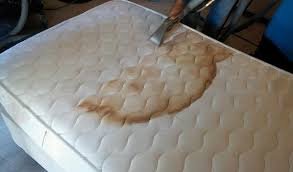How Brooklyn’s Humidity Affects Your Mattress and Why Regular Cleaning is Essential
Brooklyn’s humid climate can lead to mold, dust mites, and odors in your mattress. Regular cleaning is essential to maintain a healthy, fresh, and long-lasting sleep environment.
Brooklyn, with its mix of hot summers, coastal breezes, and temperate seasons, experiences varying levels of humidity throughout the year. This humidity, often exacerbated during the summer and rainy months, can have a significant impact on your mattress, creating conditions that can lead to mold, mildew, dust mites, and even unpleasant odors. While you may invest time and effort into keeping your floors, furniture, and home surfaces clean, your mattress, where you spend about one-third of your life, can often be forgotten. However, in Brooklyn’s climate, regular mattress cleaning in Brooklyn is more than just a recommendation—it’s essential.
In this blog, we will explore how humidity affects your mattress, the problems that can arise if your mattress is not regularly cleaned, and actionable solutions for maintaining a clean, healthy, and long-lasting mattress in Brooklyn’s humid environment.
The Effects of Humidity on Your Mattress
Humidity refers to the amount of moisture in the air, and in Brooklyn, the humidity can be particularly high, especially in the summer when levels frequently exceed 60-70%. While this moisture may be less noticeable indoors than outside, it still seeps into your home, including your mattress. The material of most mattresses—be it memory foam, latex, or innerspring—acts like a sponge, absorbing and retaining this moisture. Over time, this moisture buildup can lead to serious issues.
1. Mold and Mildew Growth
One of the primary concerns with a humid environment is the potential for mold and mildew to form. Mold thrives in damp, dark environments, making your mattress a perfect breeding ground. Mold and mildew spores can penetrate deep into the fabric and padding of your mattress, becoming impossible to remove without professional help. Not only can this cause unpleasant odors, but exposure to mold spores can also trigger allergies, respiratory issues, and skin irritation.
2. Increased Dust Mite Activity
Dust mites are microscopic pests that thrive in humid environments. They feed on dead skin cells and love the soft, fabric-covered surfaces of mattresses. High humidity encourages dust mites to multiply quickly, leading to increased allergen exposure. Dust mite droppings can cause allergic reactions, leading to symptoms like sneezing, coughing, watery eyes, and asthma flare-ups.
3. Odors and Bacteria Buildup
Humidity accelerates the growth of bacteria, which can lead to unpleasant odors emanating from your mattress. Sweat, spills, and everyday moisture can seep into your mattress, creating the perfect environment for bacteria to flourish. Over time, your mattress can develop a musty or sour smell that disrupts your sleep environment and affects overall hygiene.
4. Premature Mattress Deterioration
The materials used in mattresses are sensitive to moisture. When exposed to high humidity over time, the structure of the mattress, especially foam, latex, or cotton padding, can begin to break down. This can lead to sagging, loss of support, and overall deterioration of the mattress. High humidity can also cause mattress covers and seams to weaken, shortening the lifespan of your investment.
Why Regular Mattress Cleaning is Essential
Given Brooklyn’s humid climate, regular mattress cleaning is not just about keeping your mattress looking fresh—it’s essential for maintaining a healthy, comfortable, and long-lasting sleep environment. Here’s why routine cleaning is crucial:
1. Prevention of Mold and Mildew
Regular mattress cleaning can prevent the buildup of mold and mildew. By using techniques that reduce moisture and remove contaminants, you can keep your mattress free from harmful mold spores. Regular cleaning, especially if done professionally, ensures that your mattress is deep-cleaned and dried thoroughly, eliminating any existing mold or mildew and preventing future growth.
2. Reduction of Allergens
Dust mites and their droppings are a major cause of allergies and asthma, particularly in humid environments. Regular cleaning removes the dust mites, dead skin cells, and other allergens that accumulate in your mattress, providing relief for allergy sufferers and improving the overall air quality in your home. If you or a family member experience frequent sneezing, coughing, or itchy eyes at night, it may be due to dust mites in the mattress.
3. Improved Hygiene and Odor Control
A clean mattress contributes to better hygiene and a more pleasant sleep environment. Routine cleaning can eliminate bacteria and prevent the buildup of sweat, oils, and other bodily fluids that lead to odors. If your mattress has already developed an unpleasant smell due to moisture and bacteria, professional mattress cleaning can help remove these odors, leaving your mattress smelling fresh.
4. Prolonged Mattress Lifespan
Your mattress is an investment, and regular cleaning helps protect that investment. Keeping your mattress free from moisture, mold, and bacteria helps preserve the structure and integrity of the materials. By cleaning your mattress regularly, you can prevent premature sagging, weakening of seams, and deterioration of the padding, ensuring your mattress lasts for many years.
Eco-Friendly Mattress Cleaning Solutions
When it comes to cleaning your mattress in a humid climate like Brooklyn’s, using eco-friendly methods is both safe and effective. Harsh chemicals can leave behind residues that may be harmful to your health or damage your mattress over time. Instead, consider these natural, non-toxic solutions for keeping your mattress clean:
1. Vacuuming Regularly
Vacuuming your mattress is a simple yet effective way to remove dust, dirt, and allergens from the surface and crevices. Using a vacuum with a HEPA filter is particularly effective for capturing dust mites and other microscopic particles. Make sure to vacuum all sides of the mattress, including the edges and seams.
2. Using Baking Soda for Odor Removal
Baking soda is a natural deodorizer that can help neutralize odors caused by moisture and bacteria. Sprinkle baking soda evenly over the surface of your mattress and let it sit for several hours (or even overnight) before vacuuming it up. This can help absorb moisture and eliminate lingering odors.
3. Sunlight Exposure
If possible, expose your mattress to sunlight for several hours. Sunlight naturally kills bacteria and dust mites, while also helping to evaporate any moisture that may be trapped inside the mattress. If your living situation allows it, placing your mattress in a sunny, well-ventilated area for a few hours can be a simple way to refresh it.
4. Essential Oil Sprays
Using a mixture of water and a few drops of essential oils like tea tree or lavender can be a great way to freshen up your mattress while naturally repelling dust mites and bacteria. Simply mix the essential oils with water in a spray bottle and lightly mist your mattress. Be careful not to oversaturate the mattress, as excess moisture can lead to mold growth.
5. Professional Steam Cleaning
Professional steam cleaning is an eco-friendly way to deep-clean your mattress without the use of harsh chemicals. Steam cleaning uses high temperatures to kill dust mites, bacteria, and mold spores while removing stains and odors. Professional cleaners can also ensure your mattress dries quickly and thoroughly, which is important in preventing future moisture buildup.
Tips for Preventing Humidity Damage to Your Mattress
In addition to regular cleaning, there are several steps you can take to prevent humidity-related damage to your mattress:
1. Use a Mattress Protector
Investing in a high-quality, waterproof mattress protector can shield your mattress from moisture, spills, and sweat. A breathable mattress protector allows air to circulate while keeping moisture out, providing a barrier against humidity.
2. Control Humidity Levels in Your Home
Using a dehumidifier in your bedroom can help regulate the moisture levels in the air. Keeping humidity levels below 50% can reduce the chances of mold, mildew, and dust mites thriving in your mattress. Air conditioning can also help control humidity during the hot summer months.
3. Rotate and Air Out Your Mattress
Rotating your mattress every few months helps ensure even wear and prevents moisture from accumulating in one spot. Additionally, airing out your mattress by removing bed linens and allowing fresh air to circulate around it can help dissipate trapped moisture.
Conclusion
Brooklyn’s humid climate can take a toll on your mattress, making regular cleaning and proper care essential for maintaining a healthy, comfortable sleep environment. From mold and mildew growth to dust mite infestations, the effects of humidity on your mattress should not be underestimated. By incorporating eco-friendly cleaning methods, such as vacuuming, using baking soda, and exposing your mattress to sunlight, you can keep your mattress fresh, clean, and free from harmful allergens.




